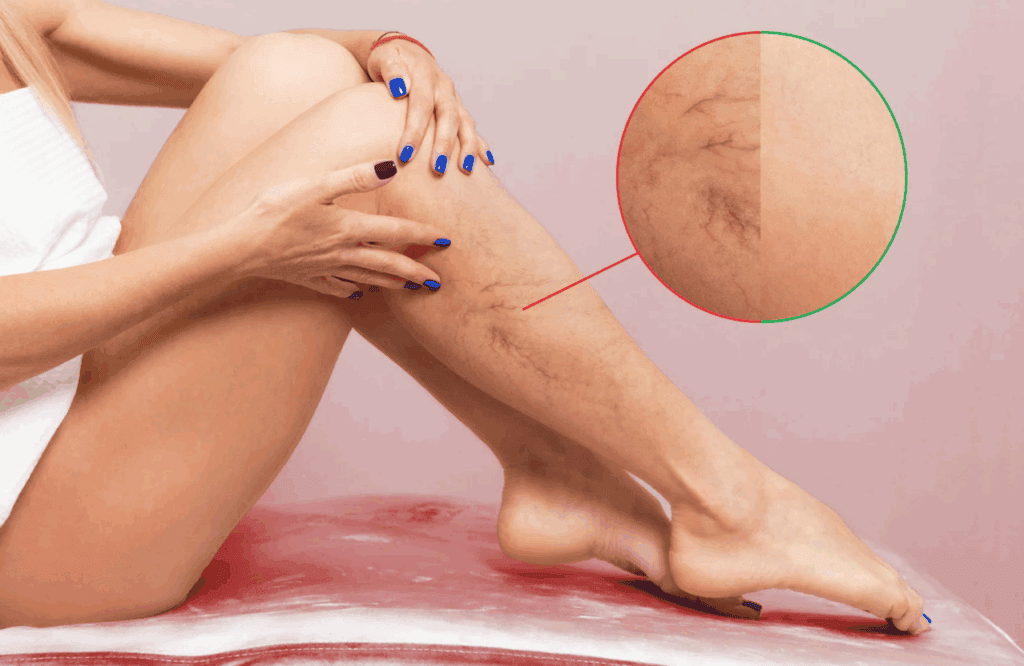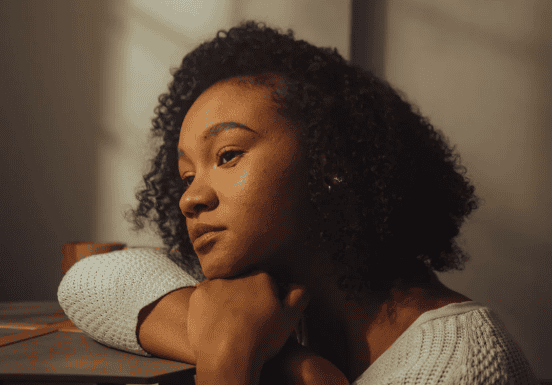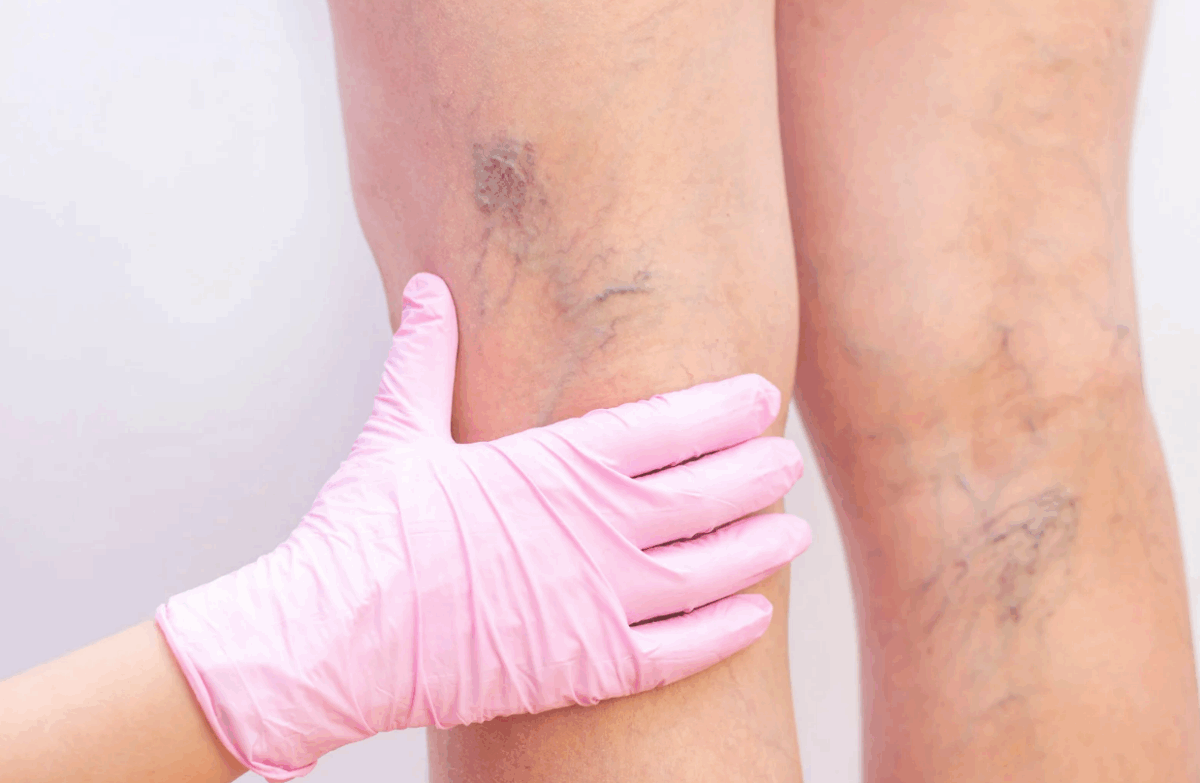When most people think of varicose veins, they picture bulging, twisted veins on the legs—a cosmetic concern or perhaps a minor circulatory issue. What’s often overlooked, however, is the significant emotional and psychological toll these vein problems can have.
Research and patient experiences increasingly show that mental health and varicose veins are deeply interconnected.
Living with varicose veins can go far beyond physical discomfort. For many, these visible vein issues affect body image, confidence, and even emotional well-being. And, in a cycle that many don’t realize, mental health can also influence the severity and progression of varicose veins.

Understanding Varicose Veins: More Than a Cosmetic Issue
Varicose veins occur when vein valves, responsible for helping blood return to the heart, become weakened or damaged. This allows blood to pool, causing veins to enlarge and protrude, most commonly in the legs. Common symptoms include:
- Aching, heaviness, or cramping in the legs
- Swelling of the lower limbs
- Throbbing or burning sensations
- Itching and skin discoloration
- Visible, twisted, or bulging veins
While often dismissed as just a cosmetic nuisance, varicose veins are a sign of chronic venous insufficiency (CVI) and can significantly impair quality of life, especially if left untreated.
Emotional Impacts of Varicose Veins
Living with visible varicose veins can be emotionally distressing, particularly when they interfere with daily routines, self-image, or physical comfort. Studies and clinical observations have found that the following psychological effects are common among patients:
1. Body Image Distress
Visible veins on the legs can make individuals self-conscious, especially in warm-weather clothing or intimate situations. This often leads to avoiding certain social events or types of clothing, fueling insecurity and social withdrawal.
2. Anxiety and Depression
Chronic pain, restricted mobility, and physical appearance concerns can contribute to anxiety and even clinical depression. A 2015 study published in the Journal of Vascular Surgery found that patients with venous disorders reported higher rates of depressive symptoms, especially when their condition was left untreated.
3. Sleep Disruption
Leg discomfort, cramping, and restlessness—especially at night—can impact sleep quality. Over time, poor sleep contributes to emotional instability, fatigue, and reduced coping ability.
4. Reduced Physical Activity
Many individuals with varicose veins reduce or stop physical activity due to discomfort or embarrassment. Reduced movement not only worsens vein conditions but also negatively impacts mood and overall health.
How Mental Health Influences Vein Health
While varicose veins can worsen mental health, the reverse is also true. Chronic stress, anxiety, and depression can have physical consequences that exacerbate vascular issues.
1. Elevated Cortisol and Inflammation
Chronic stress raises cortisol levels, which can trigger inflammation throughout the body. Inflammation weakens vein walls and valves, making varicose veins more likely to develop or worsen.
2. Sedentary Behavior
Mental health challenges often lead to reduced motivation for exercise or movement. Sitting or standing for prolonged periods without physical activity can impair circulation, one of the primary contributors to varicose veins.
3. Weight Gain
Depression and anxiety are often linked with unhealthy eating habits and weight gain. Excess body weight increases pressure on leg veins, accelerating the development and severity of varicose veins.
4. Delayed Medical Attention
Mental health issues like anxiety can cause individuals to avoid seeking treatment out of fear or low motivation. Unfortunately, the longer vein issues are ignored, the more likely they are to lead to complications like ulcers or deep vein thrombosis (DVT).

Treating Both the Physical and Emotional Aspects
Clinics take a comprehensive approach to care, addressing not only the physical symptoms of varicose veins but also their impact on patients’ emotional and psychological well-being.
Here’s how addressing vein health can improve mental health:
1. Minimally Invasive Treatments Improve Confidence
Modern vein treatments such as endovenous laser therapy (EVLT), radiofrequency ablation, and sclerotherapy are minimally invasive and provide fast, noticeable results. Patients often report renewed confidence and emotional relief following treatment.
2. Pain Reduction Increases Mobility
When varicose vein discomfort is addressed, patients are more likely to return to regular physical activity, which in turn boosts endorphin levels, reduces anxiety, and supports better mental health.
3. Better Sleep and Daily Comfort
Addressing nocturnal leg pain or restlessness results in better sleep, which is essential for emotional regulation, concentration, and overall resilience.
4. Holistic Support from Compassionate Providers
Clinics that recognize the mind-body connection, like Elite Vein Clinic, are more likely to offer empathetic care, education, and support throughout the treatment process, easing fears and improving outcomes.
Tips for Managing Vein Health and Mental Health Together
If you’re struggling with varicose veins and finding it’s affecting your mental health, here are a few supportive strategies:
- Seek Medical Advice Early: Don’t wait until symptoms worsen. Early intervention means simpler treatment and less stress.
- Move Regularly: Even light walking improves circulation and boosts mood.
- Elevate Your Legs: A few minutes a day of leg elevation can ease swelling and improve blood flow.
- Practice Mindfulness or Meditation: Stress reduction techniques lower cortisol and inflammation.
- Wear Compression Stockings: These improve circulation and reduce discomfort.
- Talk About It: Whether with a therapist, support group, or vein specialist, expressing how vein issues affect you can be healing.
Final Thoughts: Healing Both Inside and Out
The connection between mental health and varicose veins is real and more significant than many people realize. Beyond discomfort and visible veins lies a deeper struggle with self-image, mood, and mobility. The good news? Treatment can dramatically improve both physical and emotional well-being.
By addressing varicose veins through professional care and being mindful of mental health in the process, patients can find real relief, not just in their legs but in their daily lives.


